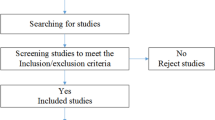Abstract
In Brazil, mathematics education was associated with Jean Piaget’s theory. Scholars in the field of education appropriated Piaget’s work in different ways, but usually emphasized logical aspects of thought, which probably lead to an expansion of mathematics education influenced by psychology. This study attempts to extend the range of interlocutions and pose a dialogue between the field of mathematics education in Brazil and the sociology of science proposed by David Bloor. The main point of Bloor’s theory is that logical-mathematical knowledge is far from being true and universal and is socially conditioned. In particular we will be discussing the first principle of the strong program, which deals with conditions that generate beliefs promoted by education policies in Brazil, such as the MEC/USAID treaties. In this case the “naturalization of logic” was stimulated by a widespread diffusion of both Piaget studies and the Modern Mathematics Movement.
Similar content being viewed by others
References
Arapiraca, J. O. (1982). Usaid e a educação brasileira. São Paulo: Cortez.
Araujo, J. A. (2005). Escola Polivalente San Diego: um estudo de caso da história e memória da educação brasileira em Salvador Bahia. Unpublished dissertation. Federal University Bahia, Salvador.
Bloor, D. (1991). Knowledge and social imagery. Chicago: The University of Chicago Press.
Bourdieu, P. (2008). Para uma sociologia da ciência. Lisbon: Edições 70.
Brasil. (2000). Parâmetros curriculares nacionais. Brasília: MEC.
Carraher, T., Carraher, D., & Schliemann, A. L. (2006). Na vida dez, na escola zero. São Paulo: Cortez.
Chevallard, Y. (1991). La transposición didática: del saber sabio al saber ensenado. Buenos Aires: Aique.
D’Ambrosio, B. S. (1987). The dynamics and consequences of the modern mathematics reform movement for Brazilian mathematics education. Unpublished thesis. Doctor Philosophy, Indiana University, USA.
D’Ambrosio, U. (2002). Etnomatemática: elo entre as tradições e a Modernidade. Belo Horizonte: Autêntica.
D’Ambrosio, U. (2009). Etnomatemática e História da Matemática. In M. C. Fantinato (Ed.), Etnomatemática: novos desafios teóricos e pedagógicos (pp. 17–28). Niterói: Universidade Federal Fluminense.
Ferreira Leal, M. (2002). Idéias Matemáticas de Povos Culturalmente Distintos. São Paulo: Global.
Fiorentini, D., & Lorenzato, S. (2006). Investigação em educação matemática: percursos teóricos e metodológicos. Campinas: Autores Associados.
Freitag, B. (1979). Escola, Estado e Sociedade. São Paulo: Cortez & Moraes.
Garnica, A. (2008). Resgatando oralidades para a história da matemática e da educação matemática brasileiras: o Movimento da Matemática Moderna. Zetetiké, 16(30), 173–225.
Gottschalk, C. (2008). A construção e transmissão do conhecimento matemático sob uma perspectiva wittgensteiniana. Cadernos Cedes, 28(74), 75–96.
Latour, B., & Woolgar, S. (1997). Vida de laboratório—A produção dos fatos científicos. Rio de Janeiro: Relume-Dumará.
Merton, R. K. (1968). Social theory and social structure. New York: Free Press.
Miorim, M. A. (1998). Introdução à história da educação matemática. São Paulo: Atual.
Piaget, J. (1974). Epistemologia genética e pesquisa psicológica. São Paulo: Livraria Freitas Barros.
Restivo, S. (1998). As raízes sociais da matemática pura. Cadernos de Educação Matemática, 03, 199–229.
Schubring, G. (1999). O primeiro movimento internacional da reforma curricular em matemática e o papel da Alemanha. Zetetiké, 17(11), 29–50.
Shinn, T. (1999). Prólogo. In P. Kreimer (Ed.), De probetas, computadoras y ratones: la construcción de una mirada sociologica sobre la ciencia (pp. 05–22). Buenos Aires: Universidad Nacional de Quilmes.
Stepan, A. (1988). Democratizando o Brasil. Rio de Janeiro: Paz e Terra.
Vilela, D. (2009). Práticas matemáticas: contribuições sócio-filosóficas para a Educação Matemática. Zetetiké, 17(31), 191–212.
Vilela, D., & Tacon, A. C. C. (2012). Profissionalização das licenciaturas em matemática? Estudo histórico do curso da UFSCar. Retrieved on April 11, 2012 from http://www.apm.pt/encontro/cihem.php?id=177674.
Walkerdine, V. (2004). Diferença, cognição e educação matemática. In F. Wanderer & G. Knijnik (Eds.), Etnomatemática, currículo e formação de professores (pp. 109–123). Santa Cruz do Sul: EDUNISC.
Author information
Authors and Affiliations
Corresponding author
Additional information
Lead Editor: P.C. Taylor.
Rights and permissions
About this article
Cite this article
de Andrade, T.H.N., Vilela, D.S. Contributions from sociology of science to mathematics education in Brazil: logic as a system of beliefs. Cult Stud of Sci Educ 8, 709–724 (2013). https://doi.org/10.1007/s11422-013-9499-2
Received:
Accepted:
Published:
Issue Date:
DOI: https://doi.org/10.1007/s11422-013-9499-2




